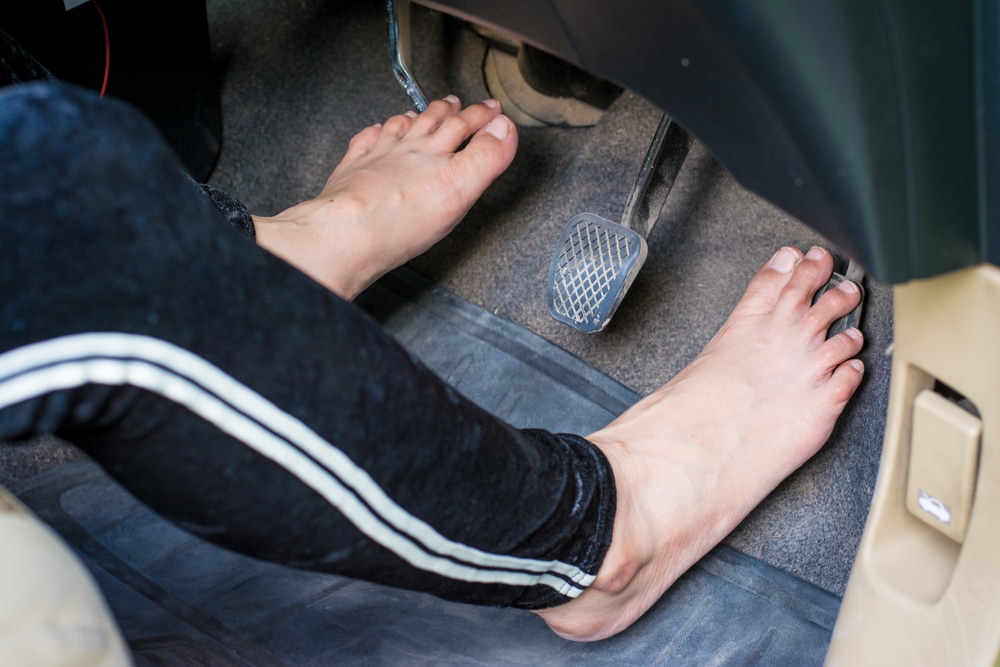Have you ever been cruising down a sunny Florida highway, windows rolled down, feeling the warm breeze in your hair, only to glance down and realize – you’re driving barefoot? It’s a common experience, especially in the Sunshine State where flip-flops and sandals reign supreme. But as you see those blue lights flashing in your rearview mirror, a question pops into your head: “Is driving barefoot actually illegal in Florida?”
The answer, unlike the Florida weather, might surprise you. In this blog article, we’ll delve into the legalities of barefoot driving in Florida, explore the safety concerns associated with it, and discuss some alternative footwear options for safe and comfortable cruising.
Laws and Regulations Regarding Barefoot Driving in Florida
Unlike some states that have specific laws prohibiting driving barefoot, Florida does not have an explicit statute outlawing the practice. This means that technically, you won’t get pulled over solely for driving without shoes. However, the absence of a specific law doesn’ t mean it’s a free-for-all on Florida’s roads.
Florida, like most states, has general safe driving laws that all drivers, shod or not, must adhere to. These laws focus on maintaining control of the vehicle and operating it in a manner that doesn’t endanger yourself or others. So, while there’s no law against barefoot driving specifically, if your lack of footwear impairs your ability to drive safely, you could be cited for violating these general safe driving regulations.
Safety Concerns Associated with Barefoot Driving
Even though Florida law doesn’t explicitly prohibit barefoot driving, there are valid safety concerns to consider. Here’s how the absence of shoes can impact your driving ability:
- Reduced Feel and Control: Our feet are packed with nerves that provide essential feedback about the position and pressure being applied to the pedals. Shoes, especially those with good treads, provide additional grip and a more precise feel for the pedals. Barefoot driving can lead to a feeling of disconnect, making it difficult to modulate pressure accurately on the gas and brake pedals.
- Risk of Slipping Off Pedals: Florida’s heat and humidity can cause your feet to sweat, making them slippery. This can increase the risk of your foot slipping off the pedals, especially during sudden stops or maneuvers. Imagine trying to brake hard in an emergency situation and your foot slipping off the pedal – a dangerous scenario to say the least.
- Difficulty Modulating Brake Pressure: Applying the right amount of pressure for smooth braking is crucial. Barefoot driving can make it challenging to feel the subtle gradations in pressure needed for controlled braking, potentially leading to jerky stops or delayed braking response times.
Potential Consequences of Barefoot Driving (Even Though Not Illegal)
While you might not get pulled over solely for driving barefoot in Florida, there can still be some unintended consequences:
- Increased Chance of Getting Pulled Over for Other Traffic Violations: If a police officer observes you committing a traffic violation, like speeding or failing to yield, they might pull you over. During the stop, if the officer notices you’re barefoot, it could raise suspicion and lead to further questioning or scrutiny.
- Difficulty Reacting Quickly in Emergency Situations: Barefoot driving can hinder your ability to react swiftly in an emergency. The precious milliseconds lost due to reduced feel or a slipping foot can make a significant difference in avoiding an accident.
- Contributing Factor in an Accident (During Insurance Claims): If you’re involved in an accident while driving barefoot, and the insurance company finds that your lack of footwear might have contributed to the accident, it could negatively impact your claim.
- Wearing Comfortable Shoes for Driving: Opt for shoes that provide good grip and support for your feet. Avoid bulky shoes or sandals that might snag on the pedals. Lightweight sneakers, driving shoes, or loafers are all great options.
- Keeping Flip-Flops or Sandals in the Car for Quick Changes: If you prefer the feeling of being barefoot when you’re not driving, consider keeping a pair of flip-flops or sandals in your car. You can easily slip them on or off before and after getting behind the wheel.
Here are some additional tips for safe and comfortable driving in Florida:
- Adjust Your Seats: Make sure your seat is positioned correctly so you can comfortably reach and operate the pedals with your entire foot.
- Use Floor Mats: Good quality floor mats can provide extra grip for your feet and prevent them from slipping on the car’s floorboards.
- Stay Hydrated: Florida’s heat can lead to dehydration, which can further contribute to sweaty feet. Drinking plenty of water will help keep your feet comfortable and improve your overall focus while driving.
Conclusion
While Florida doesn’t have a law specifically outlawing barefoot driving, it’s important to remember that safety should always be your top priority. The potential dangers associated with reduced feel, slipping pedals, and impaired braking response are significant. Opting for comfortable shoes or keeping a change of footwear in your car are simple yet effective ways to ensure safe and enjoyable driving on Florida’s scenic highways.
Remember, the choice ultimately comes down to you. But before you hit the road with your toes wiggling in the breeze, consider the safety implications and make an informed decision. After all, the beautiful Florida landscapes are best enjoyed when you arrive at your destination safely.
Additional Resources:
- National Highway Traffic Safety Administration (NHTSA): https://www.nhtsa.gov/
- Florida Department of Highway Safety and Motor Vehicles (FLHSMV): https://www.flhsmv.gov/
Disclaimer: This blog article is for informational purposes only and should not be construed as legal advice. Always consult with a qualified legal professional for any questions or concerns regarding traffic laws in Florida.



